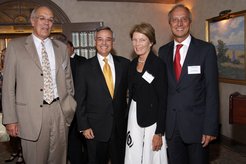Max Planck Florida Institute welcomes new scientific director
Reception and presentation by Nobel Laureate Dr. Bert Sakmann as inaugural scientific director

Business and community leaders joined Dr. Peter Gruss, President of the Max Planck Society at a reception to welcome Nobel Laureate Dr. Bert Sakmann as the inaugural scientific director of the Max Planck Florida Institute. Sponsored by the law firm of Gunster, the event was held at the City Club of the Palm Beaches and featured a presentation by Dr. Sakmann about his research focus at the Jupiter-based Institute. Sakmann will concentrate on studying the arrangement of nerves in the brain with the goal of advancing the understanding of brain degenerative diseases, such as Alzheimer’s.
Among the guests were Palm Beach County Commissioner Jess Santamaria; Town of Jupiter Mayor Karen Golonka; Vice Mayor of Palm Beach Gardens David Levy; Rep. Mary Brandenburg; George Elmore of Hardrives, Inc.; Miriam Metzger of the German American Business Chamber of Florida; German Consulate General Klaus Ranner; Dr. Ramaswamy Narayanan and Dr. Gary Perry of Florida Atlantic University; Dr. Gary Margules of Nova Southeastern University; Dr. Bahaa Saleh of the University of Central Florida; Cynthia Toth of Palm Beach Atlantic University; Robert Goldberg and John Haynie of The Benjamin School; H. William Perry and Mike Mitrione of Gunster, Attorneys at Law; Nicole Christian of the North Palm Beach Chamber of Commerce; Ken Kahn of LRP Publications; Fabiola Brumley of Bank of America; Admiral Philip Whitacre; and Andrew Duffell and Gary Hines of the Business Development Board.
"Dr. Sakmann is a superb choice for inaugural director of the Max Planck Society in the United States due to his international scientific credentials and his long relationship with our research organization," said Dr. Gruss. "He truly understands our mission and standards of excellence, and he will be a remarkable ambassador for everything the Max Planck Society represents as we establish our institute in Florida."
Dr. Sakmann and physicist Erwin Neher were awarded the 1991 Nobel Prize in Medicine for their discoveries on single channels in cells, enabled by their invention of the patch-clamp technique. This ground-breaking technical achievement made it possible to examine, in real time, the operation of individual ion channel proteins, eventually leading to the discovery of the role that they play in diseases such as diabetes, cystic fibrosis, several cardiovascular diseases and certain neuromuscular disorders. The Nobel Prize committee credited the two scientists with revolutionizing modern biology.
Under Dr. Sakmann’s direction and leadership, the Max Planck Florida Institute plans to initiate a research program dedicated to studying the structural arrangement of nerves within the cerebral cortex - the structure within the brain that plays a key role in memory, attention, perceptual awareness, thought, language, and consciousness. He intends to create a three-dimensional atlas of nerve cell bodies, dendrites and axons by first labeling the different cell types with specific fluorescent markers and then imaging and quantifying the neuron distributions to create a three-dimensional map of the normal brain. The research will not only help further our basic understanding of the degenerative disease process, but could also serve as a platform to measure the beneficial changes caused by novel therapeutic approaches such as new drugs and stem cell therapy.
The Max Planck Florida Institute is currently operating in a 3700 m3 temporary facility on Florida Atlantic University’s MacArthur Campus in Jupiter. Construction on the permanent 9300 m3 biomedical facility and laboratories is expected to begin in spring 2010, and is scheduled for completion by autumn 2011.
